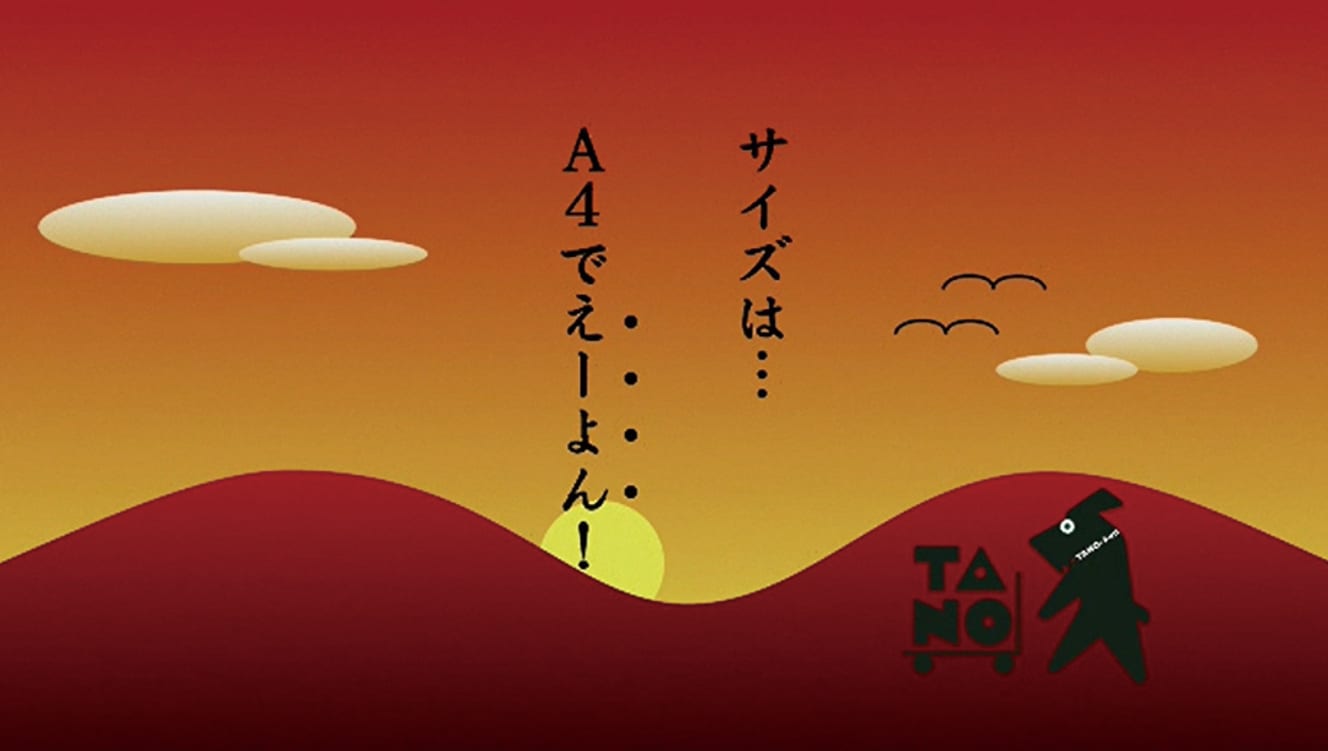Otsuka Shokai, Ranked 6th In Terms Of Job Applicants, Continues its Showa Gag Commercials
The pun was invented by the president himself!
“We’re out of copy paper. All right, let’s get some. Size…A4, please!” and “We don’t have any binders, so ask for binders.” Otsuka Shokai’s commercials are full of memorable puns. However, according to a survey by Bunka Hoso Career Partners (Minato-ku, Tokyo), which operates the “Mynavi” job-hunting website, the company ranked 6th in the “communications, IT, and software” category. While dealing in everything from office supplies to nursing care products, Otsuka Shokai is also an IT company involved in system integration. Why is such a company running commercials with a Showa-era feel?
 The above version is the most frequently aired commercial for “TANOMERU.”
The above version is the most frequently aired commercial for “TANOMERU.”says Yoshio Maruyama, Deputy General Manager of the Sales Planning Department. “The puns are selected by the president himself,” he said.
“The puns themselves are thought up by an advertising agency, but suddenly the president calls on us. If we couldn’t come up with a good one, the president and I would turn over the thick catalog of “TANTORU” and come up with something like this or like that (Laughs).”
Some of the ideas were devised by the president himself.
The president himself has devised some of his own ideas, such as , “The deskmat arrived.”
“The president never says, ‘It’s no good because it’s a ‘—’. He would ask, ‘Do you know why I said no?’ For example, I was once told that ‘There is no kyusu (teapot).’ Thinking about it, we are a solution vendor, but we are not proposing solutions. I realized that was why it was no good. He always thinks that way.”
“Somehow, I think I understand the president’s thinking better when things are rejected. I think it would be a great opportunity to learn about the president’s thinking, and I think it would be better if not only the two of them, but also other employees, participated in the process.”
The image of the company is that of the 1950s. Aiming to be the electronics store of the town.
The commercial features a dog named “Tano-kun,” which is a symbol of Otsuka Shokai’s attitude toward its customers, because dogs are loyal to their masters and will cuddle up to them.
The president of Otsuka Shokai wanted to create an image of the 1950s with a familiar character.
The 1950s is the era depicted in the movie “Sunset on Third Street.” Why in the world did you choose the 1950s?
“In those days, an electronics store in town would come to you and replace even a single light bulb on the spot. If you told them something was wrong with the radio or the TV, they would take a look at it. Otsuka Shokai wants to be that kind of company.”
“Most of our customers are small and medium-sized companies, and they have a high threshold when it comes to digitalization. They have problems with the Internet, they have had accidents with security, they don’t understand the cloud, just like they used to consult with the electronics store on the street. We cherish that image.”
Even companies unfamiliar with Otsuka Shokai’s business operations know that commercial. Even if you go door-to-door to a sales company, they will say, “That’s the company with the pun, isn’t it?” The commercials are the catalyst for conversation, and “Tano-kun” has become an important presence for salespeople.
“Our motto is ‘Leave the whole office to us.’ From a single sheet of copy paper to system integration, we are always told to listen to our customers’ ‘problems,’ build a relationship of trust, and make proposals.”
“TANO-KUN” is playing an increasingly active role in preparation for the Electronic Bookkeeping Act and the invoice system.”
The fact that the company’s commercials are inspired by the 1955s does not necessarily mean that it has an old-fashioned structure.
“Since the company was founded in 1961, we have always been a performance-based company, not a seniority-based one.”
“Personnel evaluations are not conducted solely by supervisors, but supervisors themselves are also evaluated by their subordinates, and if the evaluation is not good enough, the employee may be retrained or receive guidance from human resources.”
“Commercial message is that the company has a very well balanced and relaxed atmosphere.”
Nevertheless, commercial message is now an important tool for recruiting. Shouldn’t we promote the fact that we are a system integrator company?
“The president has always been very strong in his desire to promote the company as a system integrator, but since last year we have been running a commercial titled ‘We want to be the digital transformation for you.’ However, awareness is still low, and I think it will take time for people to understand that the commercial is for Otsuka Shokai (laughs).”
Otsuka Shokai is not a manufacturer; it purchases products from a variety of manufacturers and creates systems that best suit its customers.
“We believe that is our strength.”
“We have several companies that have become our business partners, so we can introduce our customers to manufacturers who can provide products from among them.”
“The ‘Revised Electronic Bookkeeping Act’ will go into effect in January 2022, and the invoice system will start in October 2023. System integration will become increasingly important.”
“At such times, ‘Tano-kun’ can be used as a breakthrough to enter the market and say, ‘Actually, we are an IT company.’ Tano-kun has been very useful for us in developing new clients.”
Interview and text by: Izumi Nakagawa
